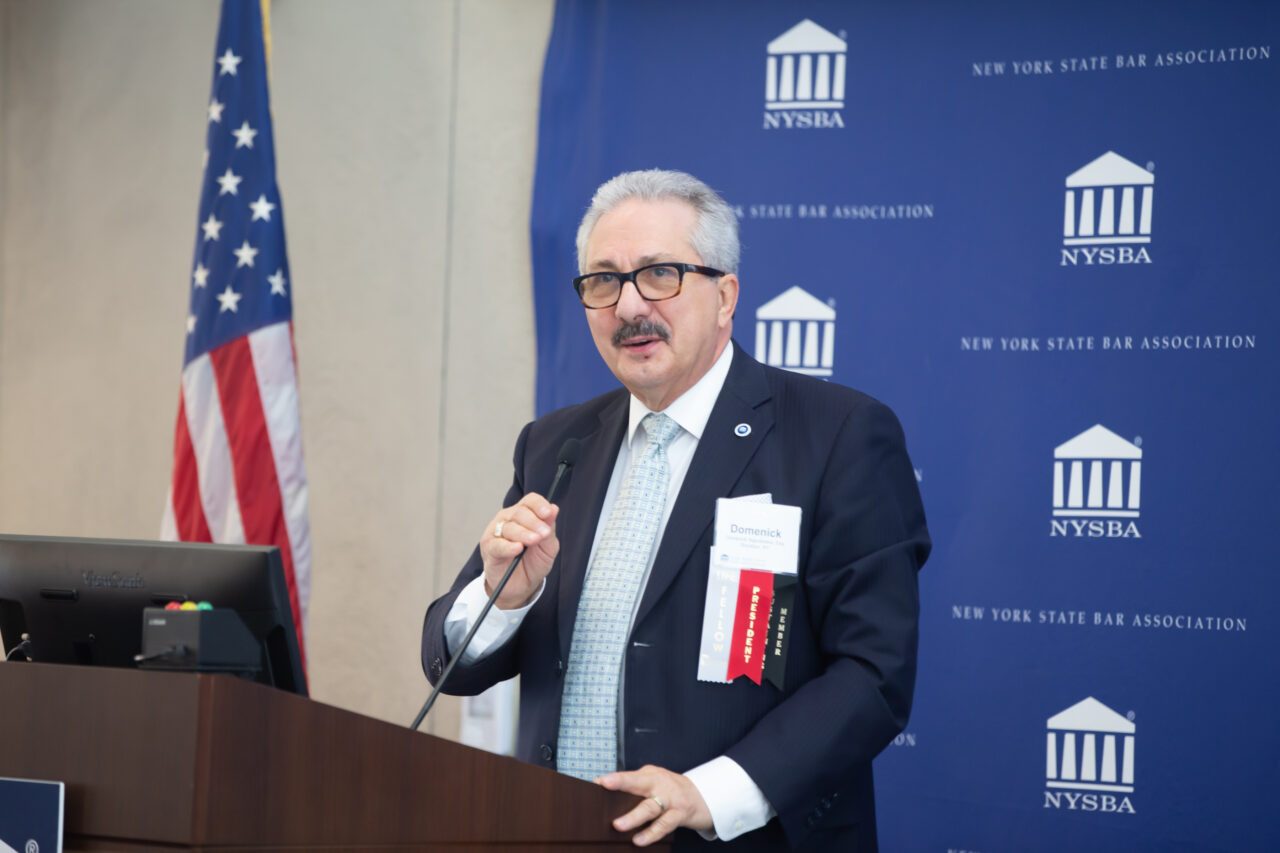New NYSBA Task Force on Opioid Addiction Is Making Headway
12.9.2024

Opioid addiction is a public health crisis that affects all walks of life. This crisis is most devastating in marginalized communities that lack the resources to provide users with appropriate care. What is needed is a comprehensive program to ensure that all persons addicted to opioids, whether in cities or suburbs, in affluent neighborhoods or marginalized communities, will receive the treatment they need in a timely way.
To help advance these goals, NYSBA President Domenick Napoletano has appointed the Task Force on Opioid Addiction, including co-authors Mary Beth Quaranta Morrissey, Nigel Farinha and Robert Kent, to review and analyze the various initiatives that have been put forth so far and make recommendations on what steps are needed to produce a comprehensive strategy.
One of the many challenges in addressing the opioid crisis is grappling with the full breadth and complexity of the problem. There is always the temptation to settle on quick fixes that may run the risk of reducing the problem to a single-dimensional analysis.
Similarly, in evaluating existing policies or designing new policy proposals, all-or-nothing scenarios may seem attractive at first blush. However, given the experience we have in confronting the opioid addiction crisis in New York, as well as the knowledge we have about what’s happening across the nation, we are called to pause and slow down the churning to allow a closer look at what’s happening on the ground. We need to understand what is driving both burgeoning rates of addiction and the glaring failures to make treatment available to those who are in desperate need, such as those incarcerated in prisons and jails.
A very helpful and essential frame in this context is, of course, public health. We know from the pandemic that understanding the coronavirus threat as a public health crisis proved critical to effective policy interventions. Here, too, it is all too clear that when it comes to opioid addiction, we are dealing with a crisis that is affecting not only individual lives, but marginalized communities and populations across the state. We call attention in particular to the limited access to treatment in correctional facilities.
The task force is examining various initiatives and will develop recommendations to be submitted to the NYSBA House of Delegates in January as an initial informational report. At this time, the following reports, issues, and pending bills are under study.
Office of Court Administration Report
The NYSBA Task Force on Opioid Addiction recognizes that our lawmakers in Albany can play a vital role in expanding treatment options for justice involved individuals through thoughtful and appropriate legislation. For example, our task force welcomes the opportunity to review proposals such as the 2023 N.Y. Senate-Assembly Bill S1976B/A1263B, often referred to succinctly as the “treatment not jail” bill, to ensure it addresses the needs of those most impacted by the opioid crisis and our justice system. The Unified Court System has already offered an extremely comprehensive comment on this proposed legislation that warrants careful consideration. Their critique is over nine pages in length and is quite detailed in its analysis. The entire report is worth a diligent review, but in the interest of time, we highlight a few of their most salient points as they track many of the same issues and concerns that have captured the attention of this task force.
For example, the “treatment not jail” bill requires that eligible defendants must be offered court-administered diversion options. However, it does not establish funding for this mandate. As the report points out, most diversion programs are actually administered to participants through third-party service providers working collaboratively with our court system to offer essential counseling and treatment for those who need them. A law that simply requires a court to offer diversion without providing that court with the means to do so is an illusory one.
Another point that the report makes concerns the expansion of the eligibility requirement. Everyone, including the Unified Court System, agrees that increasing the number of people in treatment programs represents a welcome alternative to increasing the number of people in our prisons. That said, the UCS believes it is irresponsible to simply expand program eligibility to include any defendant, at any time. The UCS argues, with considerable persuasion, that this broad expansion (without concern for severity of the alleged offense, degree of the alleged crime or potential functional impairment of the relevant defendant) runs the risk of overclassifying those the court believes could most benefit from diversion. And by overburdening an already strained system, we run the risk of not providing essential services to those most in need of them and most likely to benefit from a diversion option.
Finally, and perhaps most significantly, the “treatment not jail” bill would also remove the up-front plea requirement for eligible defendants. Presumably, the relaxation of this prerequisite was designed to emphasize the point that we are ultimately trying to treat our addicted population, not incarcerate them. That said, the UCS points out that the information it is receiving from actual diversion court judges suggests that removing this provision may actually have the exact opposite effect. These judges point out that much of the incentive and motivation for early participants in these programs is a defendant’s acceptance of responsibility for their actions and a willingness to accept treatment as the first step toward making amends. Further, this acceptance of responsibility actually helps to ensure program completion by successful participants. The UCS acknowledges that certain collateral consequences may result from a guilty plea that may impact housing, employment and immigration status. However, the way to navigate around those concerns is to augment judicial discretion to adjust pleas as needed. To simply remove the plea requirement entirely would undermine the effectiveness of the remedy we are trying to achieve in the first place.
Our task force has looked long and hard at the recommendations in this report and we see the wisdom in their analysis. Notwithstanding such, the task force will be making suggestions for legislation and policy in our final report that are consistent with our experience and due diligence.
Expanding Access to Overdose Reversal Agents
Reversing overdoses and expanding access to overdose reversal agents are the first steps to stopping overdose deaths. There is already pending legislation (2023 N.Y. Senate-Assembly Bill S8991/A8075), which would require New York State to make all FDA-approved forms of overdose reversal agents available. Current law requires schools and SUNY campuses to make overdose reversal agents available. The task force is examining what other settings should have overdose reversal agents available.
Workforce Gaps
The addiction care system faces significant challenges in recruiting and retaining workers, and such gaps are impacting access to treatment. The task force is convening stakeholder experts to make recommendations to the state on programs to address such workforce issues. Possible recommendations include using opioid litigation settlement funds and opioid stewardship funds to pay for new initiatives that may include loan forgiveness, scholarships and tuition reimbursement and exploring whether to allow addiction care providers to buy into the state retirement system and the New York State Employee Health Insurance Program. The group will also review the Office of Addiction Services and Supports’ staffing regulations for recommendations for possible changes to address the crisis without compromising patient safety.
The task force has also received feedback to date from its members, as well as stakeholders and researchers, that a significant yet overlooked concern in these contexts is the experience of trauma and grieving lived through by members of the workforce who are regularly bearing witness to pain, suffering, and loss of life in their interface with the problem of addictions. In response to the voicing of these overarching and urgent concerns and the moving testimonies heard to date, the Task Force will review relevant research and sharpen its focus on the unmet mental health needs of workers across all systems. Crafting recommendations that address the development of workforce education and training as informed by the goals of palliating pain and suffering is one priority of the task force.
EMT Initiation of Addiction Medicine
There is also pending legislation (2023 N.Y. Senate-Assembly Bill S9926/A9882) that would allow advanced emergency medical technicians to administer the opioid use disorder medicine, buprenorphine, in the field under the supervision of a physician. The state of New Jersey also allows this.
Medicaid Reimbursement
The task force will be reaching out to stakeholder experts to review the current Medicaid reimbursement model for substance use services and develop possible recommendations for changes to the model.
SUD Services in Jails and Prisons
Also under study is a proposal that the state apply for a federal 1115 Medicaid waiver to provide substance use disorder services for up to 90 days prior to release. This federal waiver would better enable state and local correctional facilities to meet their legal requirements pursuant to Section 19.18-c of the New York Mental Hygiene Law.
Expanding Access to Methadone
Turning to federal law, the Modernizing Opioid Treatment Access Act (S644/H.R.1359) would allow board-certified practitioners to prescribe methadone for opioid use disorder to their patients. Currently, they are only allowed to offer methadone through a licensed opioid treatment program. This proposed legislation would allow qualified practitioners to prescribe methadone either at an opioid treatment program or by a physician or psychiatrist with a specialty certification in addiction medicine.
Any person who wishes to share information with the task force may reach out to Dr. Mary Beth Quaranta Morrissey, chair, or David Miranda, NYSBA general counsel.
Mary Beth Quaranta Morrissey, PhD, is chair of the New York State Bar Association Health Law Section and a healthcare and public health law attorney. She is associate professor and director of the PhD program in social welfare at Yeshiva University Wurzweiler School of Social Work and a researcher. She served as past chair of NYSBA’s Medical Aid in Dying Task Force and the COVID Task Force on Mandatory Vaccination. She is also the founder and president of the Collaborative for Palliative Care that provides interdisciplinary palliative care and public health workforce education and training.
Nigel Farinha is an executive assistant district attorney in the Office of the Special Narcotics Prosecutor of the City of New York, where he serves as the chair of the Conviction Review Committee, the chief of gang prosecutions and the chief diversity, equity and inclusion officer. He is also the chair of the District Attorneys Association of New York’s Diversity Committee. He served as part of Police Commissioner Bratton’s 2015 NYPD Gang Enforcement Reengineering Committee and was the 2017 recipient of the Thomas E. Dewey Award for Excellence in Prosecution. He is the treasurer for the NYSBA Criminal Justice Section.
Robert Kent is the president of Kent Strategic Advisors, a consulting firm focused on drug policy and assisting stakeholders with making treating and recovery more accessible. He most recently served as general counsel with the White House Office of National Drug Control Policy. Prior to that, he served as the general counsel for the New York State Office of Addiction Services and Supports.







